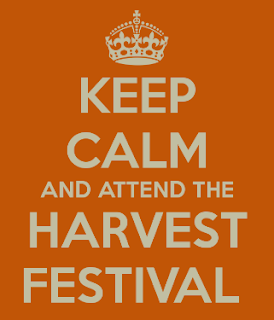Trinity and Harvest Festival
Last week some of us struggled to keep up with St. Patrick once he gave up on his bad analogies. What he said was, "The Trinity is a mystery which cannot be comprehended by human reason but is understood only through faith and is best confessed in the words of the Athanasian Creed, which states that we worship one God in Trinity, and Trinity in unity, neither confusing the Persons nor dividing the substance, that we are compelled by the Christian truth to confess that each distinct Person is God and Lord, and that the deity of the Father, the Son and the Holy Spirit is one, equal in glory, coequal in majesty." (St. Patrick's Bad Analogies -https://www.youtube.com/watch?v=KQLfgaUoQCw) Whew!
For many, one of the important features of traditional Trinitarian
theology is the relationship between the three persons. I wonder what words we
might use to describe this relationship. For me words like mutuality, love, generosity,
and compassion come to mind. I am invited to be open to meet God in these kinds
of relationships. And I am invited to live in ways that I build those kinds of
relationships with others. This is what it means to live our Trinitarian
theology.
Today is our harvest festival; a day to give thanks for God’s
ongoing generosity in the harvest. We might also give thanks for those who work
in this land and overseas providing the food we eat. It is also Matariki which
is, among other things, a time for preparing the soil for the next crop. There
is no harvest without the earth. Harvest festivals remind us of the need to
cherish the land and water.
How then might we describe our relationship with the earth
which provides us our food? And what about those who work the land here and
overseas, those who work transporting the food – too often in appalling
conditions, and those who work in the stores we buy from. What kinds of relationships
do we have with them or do we take it for granted? Today offers a chance to put
our Trinitarian theology into practice, and to take stock of how we see and
treat all these people and this good earth. What might we do differently so that
our dealings with all these, either directly or indirectly, mirror the relationship
at the heart of the Divine?




Comments